
1 Art
In college, a girlfriend and I huddled in my dorm room in the dark, reading “The Telltale Heart” by candlelight, giving ourselves a delightful case of the shivers. (Yes, I really was that weird.) Our reading would have been even eerier if we’d had a copy of Poe with Harry Clarke’s haunting, even creepy, illustrations. On second thought, it’s probably better we didn’t.
In a similarly creepy vein, how about these skull-shaped bookshelves? I wouldn’t want one of them in my living room (I’m not that weird), but I still think they’re pretty cool.
And just for fun, check out these photos of serious writers in unguarded, even silly, moments. I love Eudora Welty watering her lawn. And Vladimir Nabokov chasing butterflies while sporting sweater-with-shorts chic? Classic! Then there are the Baywatch studmuffins Kurt Vonnegut and Tom Wolfe. Awesome.
2 News
Books of poetry turned into movies? Strange but true. James Franco has lined up several famous-to-people-who-are-not-me actresses to play in movie versions of Black Dog, Red Dog by Steven Dobyns and Tar by C.K. Williams. Now, who’s going to make a movie version of The Prelude?
It wouldn’t surprise me if someone made a movie out of this: Twitter-poet Patricia Lockwood learned that her husband was going to go blind unless he got a $10, 000 eye surgery pronto, so she told the twit-o-sphere, and her followers donated the whole shebang—in less than 12 hours! You gotta read this one, tweeps.
3 Publishing
Author Neal Stephenson has an interesting take on the literary vs. commercial divide in publishing. (If you make the jump, skip trolly question 1 of the “interview” and just read his answer to question 2, headed The lack of respect.) Question for you: do you aspire to be a Beowulf or a Dante?
Either way, you’ll still need a publisher. The Los Angeles Review of Books has launched a new series of essays, each focused on a different publisher. Called Portait of a Press, their first installment highlights the work of Verse Press (now Wave Books). A fascinating look into the small world of a small press.
4 Reviews
I found this review of Harryette Mullen’s Sleeping with the Dictionary intriguing. But I also felt annoyed: No link to the book! No image of the cover, which was so enticingly mentioned at the end! So I found the book and cover art for you, too. Here’s the book. And here’s an interview with Mullen about the book.
Oh. My. Goodness. It’s a poem. It’s a book. It’s a piece of art. Maria Popova writes a glowing review of “I Saw a Peacock With a Fiery Tail.” You have to see this one.
5 Creativity
Here on Tweetspeak, we’ve heard from a number of folks whose journeys into poetry came in the form of an outlet for adolescent angst. I remember one guy saying he wrote a whole book of poems to impress a girl. He’s in good company: poet laureate Charles Simic admits that waxing poetic started with his desire to impress girls. Of course, Simic is notoriously tongue-in-cheek, so I’m not sure we should believe him. Then again, he had to start somewhere. So: what sparked your poetic fire?
For me, it’s the words. I love ’em. Edward Lear, King of British nonsense literature (but not to be confused with King Lear), did, too. Had he lived, Mr. Lear would have been 200 years old last Saturday. While he didn’t coin nearly as many words as the author of the other Lear, his creative vocabulary included such delights as plumdomphious, Ploffskin, Pluffskin, and Pelican jee (oh me!). Also scroobious, as in:
“It is impossible to imagine a more scroobious and unpleasant sound than that caused by the simultaneous sneezing of many millions of angry Mice.”
In the account of the adventurous peregrinations of four audacious and apprehensive children in which the above extract originally appears, he also inappropriately and inadvertently abused words simply because (I assume) he appreciated the way they articulated when alliterating or assonating. But he went still further: appropriating arcane and archaic appellations to advance his own abominable and apathetic aims.
(You may call me Lady Lear.)
6 Write-It
To get your creative juices flowing check out Tweetspeak‘s photo-based poem prompt for this week. Add your own poem in the comments. Or on your Facebook page. Or on our Facebook page.
Or if you’re looking for thirteen ways of looking at a blackbird (or a scarf or a shoe or a sidewalk), check out Eight Takes and let your inner Wallace Stevens out to play.
7 Poems
WARNING: Shameless act of self-promotion ahead! (Ahem.) In recent weeks, I’ve taken a page out of Maureen Doallas‘s book and written a series of found poems to raise awareness about human trafficking and to raise money for Love 146 and International Justice Mission. For some reason, poetry about children sold into brothels isn’t bringing in readers by the truckload (now there’s a shocker). Still, won’t you stop by and leave your John Hancock in support of these girls?
On a much lighter and more delicious note, Barbara Crooker celebrates all things dark and sultry in her ode to chocolate.
Ode to Chocolate
I hate milk chocolate, don’t want clouds
of cream diluting the dark night sky,
don’t want pralines or raisins, rubble
in this smooth plateau. I like my coffee
black, my beer from Germany, wine
from Burgundy, the darker, the better.
I like my heroes complicated and brooding…
Read the rest of “Ode to Chocolate.”
(Feeling like you want some chocolate after reading that decadent poem? Then check out our May-Play poetry prompts. If you play, you might just win some dark and sultry chocolate of your own to savor and wax poetic over.)
8 People
I remember reading Pushkin in my Eastern European lit class in college. I remember watching the opera version of “Eugene Onegin”, his famous novel-in-verse, in a Western Civ class. I remember nothing about either experience except that I had it. A Russian would be appalled. See, Pushkin is a big deal in Russia—so big that “Pushkin is our everything” is actually a famous saying there.
But he’s not such a big deal anywhere else. Pushkin’s great-great-grandson, whose name is also Alexander Pushkin (though he spells it a la Francais—Alexandre Pouchkine), is trotting the globe (the Western half of it, anyway) to try to change that. He wants to get the rest of the world to read and appreciate this greatest of Russian poets.
There’s even a documentary in the works, in which regular Russian Janes and Joes (Ivans and Ivanas?) recite Pushkin poems from memory. Apparently, he’s that kind of poet:
9 Education
Yesterday would have been Adrienne Rich’s 83rd birthday. But Rich isn’t the only feminist poet worth knowing about. So start your feminist poet education here: Flavorwire’s compiled a list of ten living feminist poets, from Maya Angelou to Alice Walker (yeah, she didn’t just write The Color Purple), along with a poem by each one of them.
Or if feminist poetry isn’t your thing, you could check out the world’s most-read books. I don’t guarantee that reading The Twilight Saga or The DaVinci Code will make you smarter (quite possibly the opposite), but you’ll get a crash course in pop culture if nothing else. N.B.: the most-read (or at least, the most sold) of those books contains quite a lot of poetry. Woot!
10 Sound n Motion
Sixty years ago last month, a very young John Ashbery (who earlier this year received a National Medal of Honor) read some of his early poems at the 92nd Street Y in NYC. (Click the play button at the top of the post to hear the recording.)
I am officially in love with this short video: a montage of the making of Ophelia’s skull, with a Millais painting making a brief cameo and Vivien Fox reading the monologue of Ophelia’s death. Altogether beautiful.
Photos by Claire Burge. Used with permission. Post by Kimberlee Conway Ireton, author of The Circle of Seasons: Meeting God in the Church Year
___________
Buy a year of Every Day Poems, just $2.99— Read a poem a day, become a better poet. In May we’re exploring the theme Roses.
- Top 10 YA and Children’s Books - July 25, 2014
- Literary Birthdays: Dorothy Sayers’ Gaudy Night - June 13, 2014
- Literary Birthdays: C.S. Lewis, Louisa May Alcott, Madeleine L’Engle - November 29, 2013
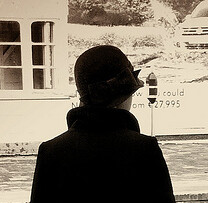
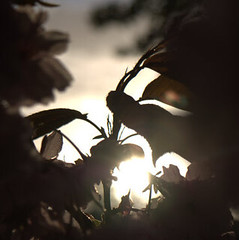


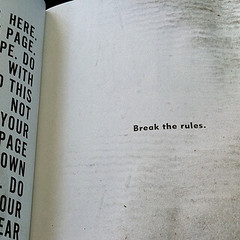
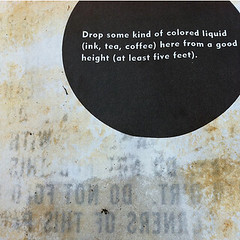




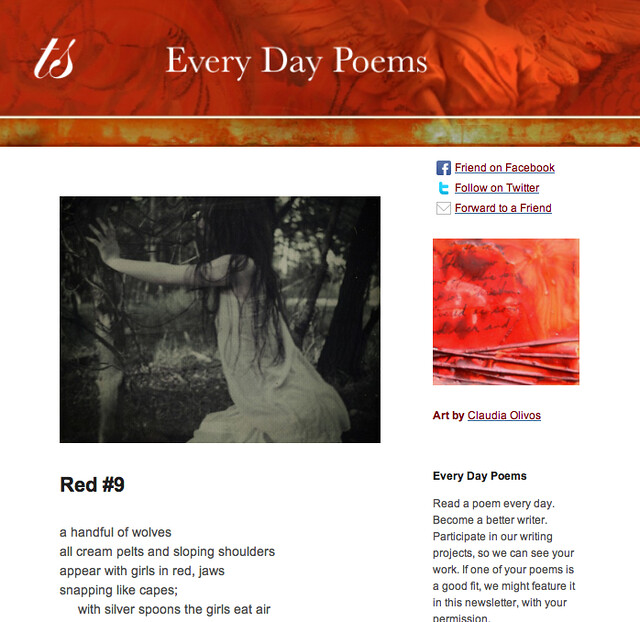
Maureen Doallas says
I love the peacock book (had to put it on my list).
Your moving “found” poem is such a wonderful way to raise money for worthy causes. I left a comment on your blog. (Thank you for the mention.)
Tania Runyan says
That lifeguard picture is the best thing I’ve seen all week! Hemingway kicking a beer can. . .all that surprising?
Megan Willome says
I enjoyed the Neal Stephenson answer as a writer who is definitely commercial and not literary. Also, “Ode to Chocolate” is a favorite. And to think that a young girl’s diary makes the list–awesome! Of course, she revised it with an eye to publication, but that just proves she was a real writer.
Kimberlee Conway Ireton says
Maureen, It was *your* found poems that inspired me to even try my hand at turning those sad and horrible stories into poetry. The poems helped me engage with them, rather than gloss over them. Thank you! And thanks, too, for leaving the comment over on my blog!
Tania, I’m so glad you liked the Wolfe/Vonnegut photo, too. 🙂
Megan, I also enjoyed Neal Stephenson’s take on commercial and literary (and appreciated his distaste for those terms 🙂 I didn’t know Anne Frank revised her diary!?! When I first read it in junior high, I’d been journaling for a few years, and I decided to name my diary, too. I used that dear-diary name (it wasn’t Kitty, but it was pitifully close) all through college…which again goes to show that I was a little, um, well, odd 😉
L. L. Barkat says
That Twitter story is stunning. And the conclusion, which is more of a question, was intriguing. Of course, people do tweet for money (are paid by companies to do so), but this seemed a bit different, almost the idea of sponsored tweeters. Interesting thought.
Kimberlee Conway Ireton says
Laura, I thought you’d like that Twitter story. I almost tweeted it to you 🙂
Will Willingham says
Kimberlee, I know your link to the story on Verse Press is really about the story of the press and how they started a publishing arm. But the story of the steamy love notes to Wendy (redheaded icon of the hamburger chain) is what really had me.
Brilliant. Great find!
Kimberlee Conway Ireton says
I should have known you’d go for the love poems to Wendy. Me, I just can’t imagine writing a love song to a CAFO burger, or even to an organic one, but to each her own, right?